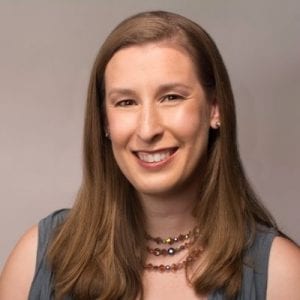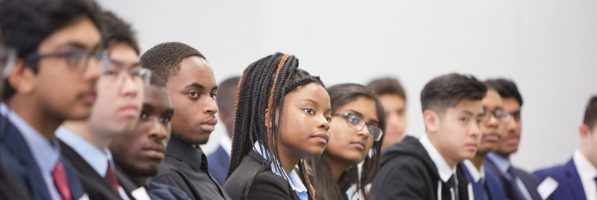Notre Dame Mendoza Announces New Master’s, and More – Chicago News

Let’s explore some of the most interesting stories that have emerged from Chicago business schools this week.
Notre Dame’s New One-Year Graduate Business Degree Focuses on Nonprofit Leadership – Mendoza Ideas & News
The Notre Dame University Mendoza College of Business recently launched a new one-year, 36-credit-hour lockstep Master of Nonprofit Administration (MNA) degree intended especially for nonprofit leaders.
Angela Logan, the St. Andre Bessette Director of Nonprofit Professional Development, says, “ Students enter the program with ‘a servant heart,’ and we believe when they graduate, they will also have ‘a business mind.’”
“The Notre Dame MNA affords students who have a commitment to serving the nonprofit sector an opportunity to learn from world-class faculty, who provide a solid business education to prepare them to lead global nonprofit organizations.”
You can find out more about the brand new Notre Dame Masters program here.
How Peer Pressure Can Lead Teens to Underachieve—Even in Schools Where It’s “Cool to Be Smart” – Kellogg Insight
A new study from Northwestern Kellogg School of Management Professor of Managerial Economics and Decision Sciences Georgy Egorov finds that in “smart-to-be-cool” schools, “kids shy away from showing effort in front of their peers” either because they might “face a social stigma for publicly making an effort to excel” but in “cool-to-be-smart” schools, they simply may not want to “reveal their poor grasp of the material.”
Egorov explains, “In a cool-to-be-smart school, students might be more likely to attend an after-school program if it is called “enrichment” rather than “extra help.” But in a smart-to-be-cool school, kids might find it more socially acceptable to seek “extra help” to avoid failing a class than “enrichment,” which suggests trying to excel.”
According to the article, “the reasons why some students fail to take advantage of educational opportunities can differ greatly depending on the school’s overall culture.”
“Administrators should understand their school’s culture when designing policies. For example, making class participation mandatory in a smart-to-be cool school could reduce the stigma of raising one’s hand. But in a cool-to-be-smart school, the same policy could provoke struggling students to disrupt class so they can avoid participating.”
You can read more about Egorov’s study here.
Student Innovator Re-imagining Restaurant Menus – Gies College of Business News
The Gies College of Business News recently profiled student Patryk Swietek, whose augmented reality app Menu3, which “allows customers to view a digital restaurant menu that features a 3D overlay of a dish right on their phone,” was a direct outgrowth of the iVenture Accelerator.”
Swietek writes, “The iVenture Accelerator was on my scope of things to do before I even started here. I’ve known for a little while now that I want to pursue entrepreneurship, but I thought it would take a little while to start on a project worthy of iVenture.”
Menu3 users can rotate photos for a 360-degree view to “help customers better understand portion sizes.” According to the article, Swietek’s first restaurant partner became Champaign’s Maize. They have since added Paris Super Crepes.
iVenture director and co-founder Noah Isserman writes, “Patryk and the Menu3 team exemplify iVenture’s distinctive, community-focused approach to entrepreneurship.”
You can read more from the Patryk profile here.
Gies Caterpillar Partnership Announced, and More – Chicago News

Let’s explore some of the most interesting stories that have emerged from Chicago business schools this week.
Government Got You Worried? It May Be Affecting Your Shopping Habits – Kellogg Insights
Northwestern Kellogg School of Management doctoral candidate Jessica Gamlin, along with professors of marketing Ping Dong and Aparna Labroo, found that “when consumers are thinking about politics, they are drawn to products they view as utilitarian rather than pleasurable.” In other words: “the more you fret about the state of the government, the more spartan your shopping cart might be.”
Speaking with Kellogg Insights, Gamlin explains her fascination with the dissonance between a seemingly banal meal-kit ad placed amidst a divisive political debate, “I was curious about why advertisers were choosing these different podcasts to advertise on in different quantities.”
Labroo also adds, “A desire for the government to do things in a more responsible manner translates into higher-order goals for the consumer, herself, to be responsible in her actions.”
Dong adds, “The reason is the more people think the political system is irresponsible, the more the desire to see the government be responsible is activated, and therefore, the more the consumer’s own goal is also activated.”
You can read more about the research here.
Caterpillar Invests in Students’ Futures with Illinois Business-Engineering Program – Gies College of Business News
As part of a decades-long relationship between the University of Illinois and the Peoria-based construction equipment manufacturer, Caterpillar has recently invested in the Gies College of Business and the College of Engineering’s new collaborative Hoeft Technology & Management undergraduate minor, in which “teams of business and engineering students learn and work together to develop comprehensive solutions to real-world problems.”
In the announcement, Caterpillar CTO and VP Tom Bluth says, “Becoming an affiliate of the program is a natural fit for us, because the intersection of business and engineering is at the core of how we develop the products and solutions that benefit our customers.
“We’re also proud to have been connected to the T&M Program since its start: A member of our Caterpillar family had the vision to create the program and the passion to make it possible.”
You can find out more about the Gies Caterpillar partnership here.
Six Marketing Fundamentals Founders Need to Succeed – Chicago Booth Magazine

Catherine Littell ’08
Chicago Booth Magazine recently profiled Catherine Littell (’08), whose Care Concierge LLC has taken an innovative approach to senior-care consulting. Littell, an Entrepreneur-in-Residence at the James M. Kilts Center for Marketing, discussed her “multipoint approach to launching a business in the digital age.”
- Know your customer. “There are a lot of great ideas out there. But can you take that idea and create a product for the right customer at the right time?”
- Hone your message. “It’s really about understanding your customer and creating an authentic experience.”
- Let the data speak. “Data will tell you whatever you want it to, good or bad, so make sure you use it to inform rather than just to affirm your decisions.”
- Run the numbers. “Starting a business is about gut feelings, but knowing the numbers can help you figure out whether or not a business is profitable or can be profitable.”
- Be comfortable with change. “You’ve got to be able to trust your gut and say, ‘If it works, great, and if it doesn’t, let’s change tactics and move forward.’”
- Hire the right team. “If you find people who have drive and passion, plus they love your product and can define what you do and stand for, that’s really powerful.”
You can read the full article here.
The Wells Fargo Scandal and a Pattern of Deceit – Chicago News

Let’s explore some of the most interesting stories that have emerged from Chicago business schools this week.
What Makes Deceit Such a Hard Habit to Break? – Kellogg Insights
New research from Northwestern University’s Kellogg School of Management‘s management and organizations department reveals why the Wells Fargo’s and Bernie Madoff’s of the world often find themselves in cycles of deceit and misconduct.
“Because morally questionable behavior is uncomfortable, people don’t want to take responsibility for it,” explains assistant professor Maryam Kouchaki, who, along with assistant professor Nour Kteily and associate professor Adam Waytz, explore what they dub a cycle of “self-dehumanization.”
It’s a process where “people subtly adjust their self-image and begin to view themselves as possessing fewer of the human traits that would curb that bad behavior. They, themselves, aren’t to blame, this line of thinking goes—they’re just not capable of behaving any better.”
You can learn more about the trio’s research here.
Business Students Develop Sponsorship Proposals for Special Olympics – Kellstadt Business Blog
As part of DePaul’s Sports Management faculty director Andy Clark’s winter quarter sports sponsorship marketing course, Kellstadt Graduate School of Business MBA students collaborated with Arena Partners on “attendance-driving ideas and sponsorship strategies” for the Special Olympics’ 50th Anniversary Celebration set to take place in Chicago this coming July.
At one point, the class hosted Kellstadt alum, DePaul Board of Trustees member, and Special Olympics of Illinois Board Chair Karen Atwood MBA ’82, who spoke of the potential impact that Kellstadt MBAs can have on their communities.
“I always think when you can see the impact that your actions, your ideas and your support bring to the larger community, the more it reinforces why the Vincentian values are so important.”
You can find out more about the Special Olympics project here.
Solutions Summit – Quinlan School of Business
The Loyola’s Quinlan School of Business Leadership Hub just announced its first annual Solutions Summit; a networking extravaganza designed especially for vice presidents, directors, and managers; supply chain leaders; and family-owned businesses.
This year’s inaugural event will host Alberto Ruocco, a Senior Executive Partner at cybersecurity leader Gartner; Reynolds VP of Category Management Nancy Bedwell; and Susan Ramonat, CEO of Spiritus, a Blockchain leader. This year’s event will be held on October 9 at the Schreiber Center on 16 E. Pearson St., Chicago.
To register for this year’s Solutions Summit, click here.
The Connection Between Social Mobility and Democracy, and More – Chicago News

Let’s explore some of the most interesting stories that have emerged from Chicago business schools this week.
Is Social Mobility Essential to Democracy? – Kellogg Insights
Northwestern University Kellogg School of Management professor of managerial economics and decisions sciences Georgy Egorov, along with MIT Sloan’s Daron Acemoglu and Chicago Booth’s Konstantin Sonin, recently created a model to understand how voters’ beliefs about social mobility affect their political preferences.
Despite older generations becoming increasingly less optimistic with the potentially positive outcomes of future generations, the researchers find that there’s a decent probability that the children of future generations will rise to a higher economic and social class.
“Having many election cycles means that even with low mobility, the likelihood that a person’s decedents will eventually end up in another class is high. Egorov compares it to two lakes connected by a narrow straight. In the short term, they will not exchange much water. But over the long term, that small exchange will grow and grow until the waters are quite mixed.”
Speaking with Kellogg Insights, Egorov elaborated:
“In a certain sense, expectation of stability begets stability. A thick middle class makes democracy more stable than a thin one. Our research highlights the problems that may follow from a shrinking or thin middle class. Additionally, if the belief in the stability of democracy is undermined, people might well decide it’s not worth defending.”
You can read more about the trio’s research here.
Mendoza Marketing Professor Wins Research Award – Mendoza Ideas & News
The 2018 Louis W. Stern Award has officially been bestowed upon Shankar Ganesan, the John Cardinal O’Hara, C.S.C., professor of business and marketing department chair at the Notre Dame University Mendoza College of Business.
The award recognizes Ganesan, as well as co-authors Steven P. Brown of the University of Houston, Babu John Mariadoss of Washington State and Hillbun (Dixon) Ho of University of Technology Sydney for a 2010 article they published in the Journal of Marketing Research entitled, “Buffering and Amplifying Effects of Relationship Commitment in Business-to-Business Relationships.”
According to the article, “The paper examines the buffering and amplifying effects of relationship commitment on organizational buyers’ intentions to switch suppliers when a relationship is strained by the incumbent’s own misbehavior. “
Check out more from Ganesan’s research here.
The Road Ahead: Takeaways from Economic Outlook 2018 – Chicago Booth Magazine
Chicago Booth Magazine recently dove into the sold-out ‘Economic Outlook 2018’ event last January to “evaluate emerging trends [and] share their insights into the economic outlook for Wall Street and Main Street—ten years after the financial crisis.”
Randall S. Kroszner, the Chicago Booth Norman R. Bobins professor of economics, offered a few optimistic projections:
“I do think [the tax cut] is going to have a positive impact, both in the short run and the long run. I think the broad direction is fairly clear: cutting personal tax rates on a weighted average, of about three percent or so, will have positive impact on demand, because that’s going to allow for higher disposable income in the short run.”
Austan D. Goolsbee, Robert P. Gwinn professor of economics and the former chairman of the Council of Economic Advisers, offered slightly more tempered but optimistic projections as well:
“The danger areas continue to be worries about China, where there has been a big acceleration of debt, and a nagging feeling that we really don’t know what’s in the European financial institutions. That said, the overall growth around the world is looking a little better, for the first time in a little while.”
You can read more about Booth’s ‘Economic Outlook 2018’ overview here.
